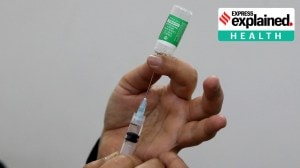- India
- International
Can eggs help you control blood sugar?
Dr Ambrish Mithal, Chairman and Head, Endocrinology and Diabetes, Max Healthcare, unravels the truth behind the egg dilemma
 Eggs have very little carbohydrate and are naturally rich in vitamin B2 (riboflavin), vitamin B12 and a number of other B vitamins like folate, biotin, pantothenic acid and choline.
Eggs have very little carbohydrate and are naturally rich in vitamin B2 (riboflavin), vitamin B12 and a number of other B vitamins like folate, biotin, pantothenic acid and choline.The egg is perhaps one of the most versatile foods on the planet. It is recognised as a great protein source and lends itself to a variety of delicious preparations to suit any taste. For years, however, the egg – especially its yolk – was under a cloud and was avoided by those with diabetes or heart disease. Let’s unravel the truth behind the egg dilemma and explore whether eggs can be a part of a healthy diet for people with diabetes.
HOW DOES PROTEIN IMPACT DIABETES?
1. When you eat carbohydrates in combination with protein (or fat), it can take longer for your body to convert the carbohydrates into glucose, leading to lower post-meal blood sugar levels in patients with Type 2 diabetes.
2. Although 1 gm of protein provides four calories, the same as carbs, it reduces the calorie intake by providing satiety, which also helps in blood sugar control.
3. A low-protein diet leads to muscle loss which increases the risk of falls and fractures in elderly diabetics.
4. Low muscle mass is a contributor to insulin resistance.
5. Low muscle mass may promote the development of fatty liver disease, which can lead to liver cirrhosis and even cancer.
WHY EGGS PACK A PUNCH
A medium sized egg (~58 g) provides 66 calories, six grams of protein and 4.6 grams of fat, with over 20 per cent of the fat belonging to the saturated variety. Eggs have very little carbohydrate and are naturally rich in vitamin B2 (riboflavin), vitamin B12 and a number of other B vitamins like folate, biotin, pantothenic acid and choline. They also contain vitamin A and small amounts of vitamin D, along with other essential minerals and trace elements, including phosphorus, iodine and selenium.
There are significant differences in nutritional composition between the white and yellow portions of the egg. Egg white provides more protein than the yolk (although yolk has a higher concentration, there is more white than yolk in an egg). The fat is almost totally contained in the yolk, making it at least three times richer in calories than the white portion. The yolk also contains more vitamins and nutrients than the white portion.
The major content of eggs is protein. Having two medium-sized eggs for breakfast will give you 12 gm protein, a great way to start the day! According to the ICMR (Indian Council for Medical Research), the daily recommended intake of protein for an adult is 0.8 to 1 gm per kg body weight. Most Indians are way below this figure, often not even consuming 0.6 gm/kg a day. No wonder then that Indians generally have low muscle mass.

HOW MUCH PROTEIN IS GOOD FOR PEOPLE WITH DIABETES?
People with diabetes should aim at getting 15-20 per cent calories through proteins on a daily basis. A higher intake (1-1.5 g/kg) is recommended for active exercisers and sportspersons. Eggs help a great deal in achieving this target. For individuals with Type 1 diabetes, eggs are a low-carbohydrate food, with only one gram of carbs per two large eggs.
WHAT ABOUT CHOLESTEROL?
The controversy surrounding eggs is linked to the cholesterol content of the egg yolk. With more than 200 mg cholesterol contained in one egg, it has been thought that this dietary cholesterol could increase blood cholesterol level, and thus the risk of heart disease. However, recent research has shown that dietary intake of cholesterol does not increase blood cholesterol levels. In other words, consuming eggs does not raise cholesterol significantly. Studies like the Diabetes and Egg (DIABEGG) study have shown that consuming up to 12 eggs per week has no adverse effects on cholesterol, triglycerides, fasting glucose, or insulin levels in people with Type 2 diabetes.
Therefore, eggs can be a valuable addition to the diet of people with diabetes, offering a rich source of protein and essential nutrients and improving muscle mass without negatively impacting blood sugar or cardiovascular health.
May 01: Latest News
- 01
- 02
- 03
- 04
- 05






























